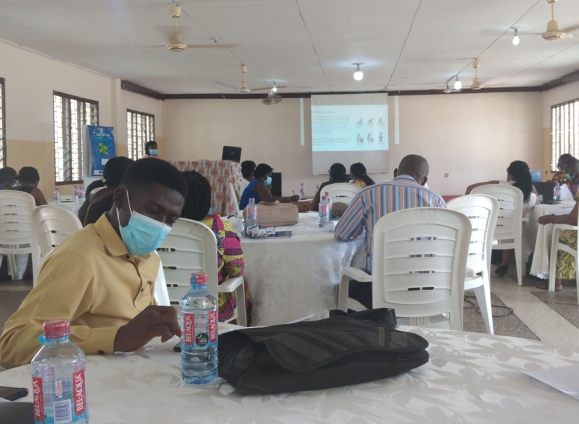Dr Selassie Adom, a Psychiatrist at the Pantang Hospital on Tuesday said beating a child as punishment
for wrong doing does not correct the behavior.
She said beating a child rather teaches the child to be violent, cautioning caregivers to find alternative
ways of correcting unwanted behavior other than beating.
Dr Adom was responding to a question by a participant at Training programme for caregivers of children
with disabilities.
The training of trainers on a training manual for caregivers of children with disability workshop was
organized by the Care Reform Initiative/ Residential Homes Management Unit of the Department of
Social Welfare.
The Department of Social Welfare with the support of UNICEF has developed a training manual for
caregivers of children with disability especially those working in residential facilities.
Dr Adom took participants through the various stages of children’s growth and development, pointing
out that children at their various stages of development need opportunities to interact with the world
around them as well as learning the rules and boundaries.
Dr Amma Ampomaa Boadu, a Mental Health Advocate, taking participants through the different forms
of disabilities in children, said “I don’t believe there is any child that cannot be taught…if you do not
have the skills to handle children with disabilities, training them becomes very stressful.”
She said about 15 per cent of the world population lives with a form of disability and said with the right
information, children with disability can be able to help themselves and even help society.
Mrs Hannah Awadzi, Executive Director of the Special Mothers Project, an advocacy and awareness
creation programme on cerebral palsy issues and issues affecting families raising children with disability,
said caregiving was a noble profession and called on the Department of Social Welfare to have a pool of
trained caregivers, fit for purpose, where parents can go to for help.
Fred Sakyi Boafo, Deputy Director, Child and Family Welfare Division at the Department of Social
Welfare, said the burden of taking care of children with a disability has been on government.
“Most private care providers or homes do not accept children with disability in their facilities, We want
to close the gap so that a time will come where every care home or residential facility will say I am ready
to accept a child with disability.”
Mr Boafo said as it is now, most children with disability deserving residential care are either placed at
the Osu children’s home or the Kumasi children’s home. We want private facilities to join in caring for
children with disabilities.
Mrs Florence Ayisi Quartey, Director at the Department of Children who represented the Minister of
Gender, Children and Social Protection, urged participants to use the knowledge they gained from the
training to support parents and children in their care.
Mrs Abena Dufie Akonu Atta, Head, Care Reform Initiative/Residential Homes Management Unit of the
Department of Social Welfare, took participants through the training manual.
Latest Stories
-
KOA Natural signs up for JoySports Invitational Tournament 2025
18 minutes -
NPP releases guidelines for 2028 presidential primary, nomination opens July 29
19 minutes -
Abuakwa South MP slams government over Mpox outbreak
26 minutes -
ECG Accra East Region joins JoySports Invitational Tournament slated for August 9
46 minutes -
Photos from ‘Climate Talks’ event held at Don Bosco Technical Institute, Ashaiman
54 minutes -
How to send money from Ghana to Nigeria without using a bank
55 minutes -
DHL signs up for JoySports Invitational Tournament 2025
1 hour -
Prof. Samuel Kwasi Dartey-Baah appointed Vice Chancellor of Central University
1 hour -
Diaspora Affairs Office at presidency endorses Vanuatu Trade Commission’s AI Africa project to train millions in AI
1 hour -
‘Enough is enough’: Africa’s miners declare new era at Zambia Summit
1 hour -
Simon Asaah makes history at Elite and Masters World Aquatics Championships
1 hour -
IBM Germany’s AIOps Chief to chart AI-driven transformation at Pan African AI Summit in Accra, Ghana
1 hour -
Book Review: Building for the Future – Positioning Ghana’s Construction Industry for Sustainable Growth
1 hour -
We’ve not been called to make money from gospel music – Kofi Owusu Peprah
2 hours -
PUSAG hails game-changing legal education reform
2 hours

